Biology:List of Apodiformes by population
From HandWiki
Short description: none
This is a list of Apodiformes species by global population. While numbers are estimates, they have been made by the experts in their fields. For more information on how these estimates were ascertained, see Wikipedia's articles on population biology and population ecology.
This list is not comprehensive, as not all Apodiformes have had their numbers quantified.
Species by global population
| Common name | Binomial name | Population | Status | Trend | Notes | Image |
|---|---|---|---|---|---|---|
| Turquoise-throated puffleg | Eriocnemis godini | 1-49[1] | CR[1] | Unknown[1] | Maximum estimate; may be extinct.[1] | 
|
| Santa Marta sabrewing | Campylopterus phainopeplus | 1-49[2] | CR[2] | Preliminary estimate for mature individuals only.[2] | 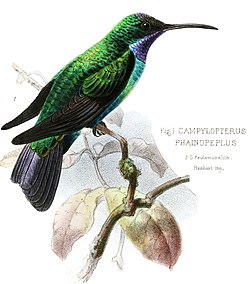
| |
| Blue-bearded helmetcrest | Oxypogon cyanolaemus | 50-249[3] | CR[3] | Estimate for mature individuals only.[3] | 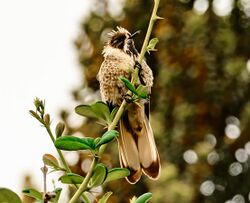
| |
| Blue-throated hillstar | Oreotrochilus cyanolaemus | 80-110[4] | CR[4] | Estimate for mature individuals only. Subpopulations include 30-50 mature individuals in Cerro de Arcos and Moras, 30–40 in Guanazan and Burrourco, and <20 in Fierro Urco.[4] | 
| |
| Black-breasted puffleg | Eriocnemis nigrivestis | 100-150[5] | EN[5] | Estimate is for mature individuals only.[5] | 
| |
| Gorgeted puffleg | Eriocnemis isabellae | 250-999[6] | CR[6] | Estimate is for mature individuals only.[6] | ||
| Buffy helmetcrest | Oxypogon stuebelii | 250-999[7] | VU[7] | Preliminary, precautionary estimate for mature individuals only.[7] | 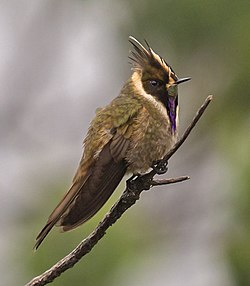
| |
| Dark-rumped swift | Apus acuticauda | 250-999[8] | VU[8] | Estimate for mature individuals is 250–700.[8] | ||
| Colorful puffleg | Eriocnemis mirabilis | 250-999[9] | EN[9] | Estimate for mature individuals only.[9] | ||
| Dusky starfrontlet | Coeligena orina | 250-2,499[10] | EN[10] | Estimate for mature individuals only.[10] | 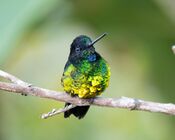
| |
| Sapphire-bellied hummingbird | Chrysuronia lilliae | 285-440[11] | EN[11] | Estimate is for mature individuals only.[11] | 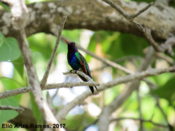
| |
| Chilean woodstar | Eulidia yarrellii | 316[12] | CR[12] | Mature individuals estimate is 210.[12] | 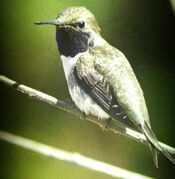
| |
| Atiu swiftlet | Aerodramus sawtelli | 340-400[13] | VU[13] | This estimate is for mature individuals only. It comes from detailed surveys over the past three decades.[13] | 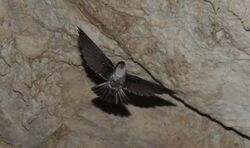
| |
| Grey-bellied comet | Taphrolesbia griseiventris | 350-1,500[14] | EN[14] | Equal to 250-999 mature individuals.[14] | 
| |
| Marvellous spatuletail | Loddigesia mirabilis | 350-1,500[15] | EN[15] | Equal to 250-999 mature individuals.[15] | 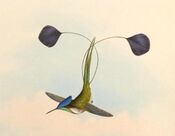
| |
| Short-crested coquette | Lophornis brachylophus | 350-1,500[16] | CR[16] | Equal to 250-999 mature individuals.[16] | ||
| Santa marta blossomcrown | Anthocephala floriceps | 500-2,500[17] | VU[17] | Estimate is for mature individuals only.[17] | 
| |
| Long-tailed woodnymph | Thalurania watertonii | 1,000-2,499[18] | EN[18] | Estimate is for mature individuals only.[18] | 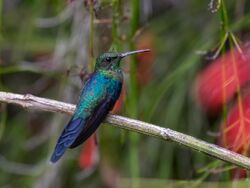
| |
| Tres marias hummingbird | Cyanthus lawrencei | 1,000-2,499[19] | NT[19] | Preliminary estimate for mature individuals only.[19] | ||
| Oaxaca hummingbird | Eupherusa cyanophrys | 1,000-2,499[20] | EN[20] | Equal to 600–1,700 mature individuals.[20] | 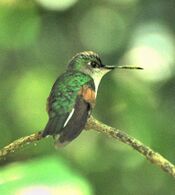
| |
| Violet-throated metaltail | Metallura baroni | 1,000-2,499[21] | EN[21] | Equates to 600–1,700 mature individuals.[21] | 
| |
| Tolima blossomcrown | Anthocephala berlepschi | 1,000-4,500[22] | VU[22] | Estimate is for mature individuals only.[22] | 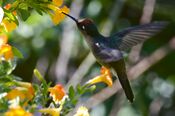
| |
| Purple-backed sunbeam | Aglaeactis aliciae | 1,500-4,000[23] | VU[23] | Equal to 1,000-2,499 mature individuals.[23] | 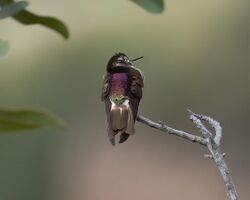
| |
| Esmeraldas woodstar | Chaetocercus berlepschi | 1,600-3,900[24] | VU[24] | Equal to 1,000-2,700 mature individuals.[24] | 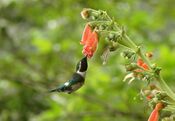
| |
| Glow-throated hummingbird | Selasphorus ardens | 2,000-12,000[25] | EN[25] | Estimate is for mature individuals only, calculated from supposed density and range of habitat.[25] | 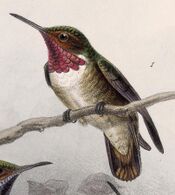
| |
| Juan Fernández firecrown | Sephanoides fernandensis | 2,065-5,263[26] | CR[26] | Numbers come directly from a model's calculations, therefore are specific. Equates to approximately 1,500-3,500 mature individuals.[26] | 
| |
| Ashy-tailed swift | Chaetura andrei | 2,500-9,999[27] | VU[27] | Preliminary estimate. This is only for mature individuals.[27] | ||
| Seychelles swiftlet | Aerodramus elaphrus | 2,500-3,000[28] | VU[28] | Population of mature individuals estimated 1,700-2,000 (1997). Trend is suspected to be stable due to no evidence of declines/threats.[28] | 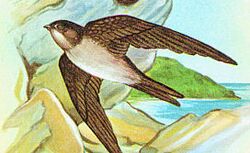
| |
| Mangrove hummingbird | Amazilia boucardi | 2,500-9,999[29] | EN[29] | Equal to 1,500-7,000 mature individuals.[29] | 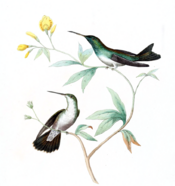
| |
| Venezuelan sylph | Aglaiocercus berlepschi | 2,500-9,999[30] | EN[30] | Equal to 1,500-7,000 mature individuals.[30] | ||
| Mariana swiftlet | Aerodramus bartschi | 2,500-9,999[31] | EN[31] | This estimate comes from a previous estimation in 2015. While subpopulations on Saipan, Guam, and Aguijan are stable or increasing, a predator of the bird is being reestablished on Saipan, so a decline is expected.[31] | ||
| Hook-billed hermit | Glaucis dohrnii | 2,800-24,000[32] | VU[32] | Mature individuals estimated at 1,900-16,000. Based on habitat spread, actual population likely to be <10,000 mature individuals.[32] | 
| |
| Dry-forest sabrewing | Campylopterus calcirupicola | 3,600-22,000[33] | VU[33] | Preliminary estimate. Equal to 2,400-15,000 mature individuals.[33] | 
| |
| Scissor-tailed hummingbird | Hylonympha macrocerca | 5,000-6,000[34] | EN[34] | Equals to 3,000-4,000 mature individuals.[34] | 
| |
| Royal sunangel | Heliangelus regalis | 5,000-12,500[35] | NT[35] | Preliminary estimate. Ecuador population estimated at 2,500 individuals, Peru at 2,500-10,000 individuals. This global population is equal to 3,000-8,999 mature individuals.[35] | 
| |
| Little woodstar | Chaetocercus bombus | 5,000-19,999[36] | NT[36] | Preliminary estimate for mature individuals only.[36] | 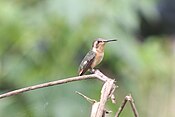
| |
| Mexican sheartail | Doricha eliza | 8,500-12,500[37] | NT[37] | Equal to 2,500-9,999 mature individuals. Subpopulations include <2,500 in Veracruz and 6,000-10,000 in Yucatán.[37] | 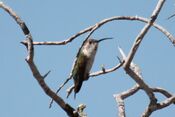
| |
| Neblina metaltail | Metallura odomae | <10,000[38] | LC[38] | Equal to <6,700 mature individuals.[38] | ||
| Honduran emerald | Amazilia luciae | 10,000-19,999[39] | VU[39] | Estimate is for mature individuals only. Equal to 5,000-10,000 breeding pairs.[39] | 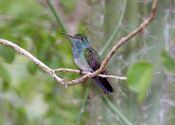
| |
| Chestnut-bellied hummingbird | Saucerottia castaneiventris | 10,000-19,999[40] | NT[40] | Estimate is for mature individuals only. There are multiple studies with varying estimates, so global population size may be changed.[40] | 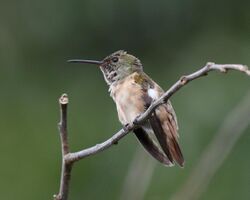
| |
| Koepcke's hermit | Phaethornis koepckeae | 10,000-19,999[41] | NT[41] | Preliminary estimate. Equal to 6,000-15,000 mature individuals.[41] | 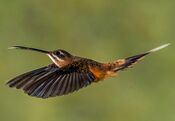
| |
| Mascarene swiftlet | Aerodramus francicus | 10,000-19,999[42] | NT[42] | Estimate is for mature individuals. This comes from a count in 2000 of 2,244-2,610 individuals on Mauritius, with population on Reunion thought to be larger. Difficult to quantify population trend, as some populations have increased and others have decreased. An overall decrease due to habitat loss is assumed.[42] | 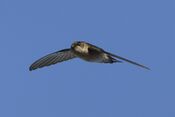
| |
| Mexican woodnymph | Eupherusa ridgwayi | 10,000-19,999[43] | VU[43] | Equal to 6,000-15,000 mature individuals.[43] | 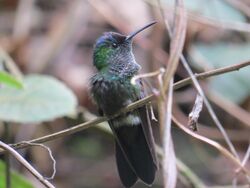
| |
| Rothschild's swift | Cypseloides rothschildi | 10,000-19,999[44] | NT[44] | These are preliminary estimates. Mature individuals estimated to be equate to 6,000-15,000 approximately. Trend is assumed due to no evidence of declines/threats.[44] | 
| |
| White-tailed hummingbird | Eupherusa poliocerca | 10,000-19,999[45] | NT[45] | Equal to 6,000-15,000 mature individuals.[45] | ||
| Black inca | Coeligena prunellei | 11,250[46] | VU[46] | Equal to 7,500 mature individuals.[46] | 
| |
| Wedge-tailed hillstar | Oreotrochilus adela | <15,200[47] | LC[47] | Preliminary estimate. Equal to 2,500-9,999 mature individuals.[47] | 
| |
| Humboldt's hummingbird | Chrysuronia humboldtii | 20,000-49,999[48] | LC[48] | Estimate is for mature individuals only.[48] | 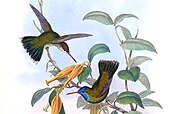
| |
| White-tailed emerald | Microchera chionura | 20,000-49,999[49] | LC[49] | Estimate is for mature individuals only.[49] | 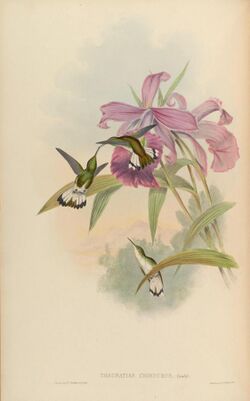
| |
| Coppery-headed emerald | Microchera cupreiceps | 20,000-49,999[50] | LC[50] | Estimate is for mature individuals only.[50] | 
| |
| Scintillant hummingbird | Selasphorus scintilla | 20,000-49,999[51] | LC[51] | Estimate is for mature individuals only.[51] | 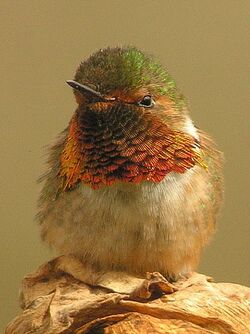
| |
| Volcano hummingbird | Selasphorus flammula | 20,000-49,999[52] | LC[52] | Estimate is for mature individuals only.[52] | 
| |
| Purple-throated woodstar | Philodice mitchellii | 20,000-49,999[53] | LC[53] | Estimate is for mature individuals only.[53] | 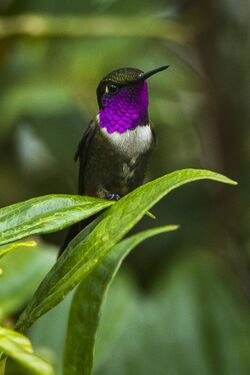
| |
| Magenta-throated woodstar | Philodice bryantae | 20,000-49,999[54] | LC[54] | Estimate is for mature individuals only.[54] | 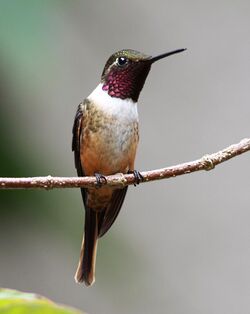
| |
| White-bellied mountain-gem | Lampornis hemileucus | 20,000-49,999[55] | LC[55] | Estimate is for mature individuals only.[55] | 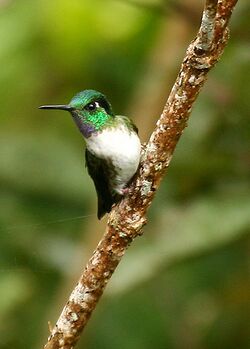
| |
| Perija metaltail | Metallura iracunda | 20,000-49,999[56] | EN[56] | No mature individual estimate available.[56] | 
| |
| White-crested coquette | Lophornis adorabilis | 20,000-49,999[57] | LC[57] | Estimate is for mature individuals only.[57] | 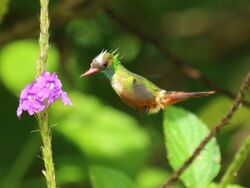
| |
| Veraguas mango | Anthracothorax veraguensis | 20,000-49,999[58] | LC[58] | Estimate is for mature individuals only.[58] | 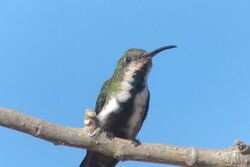
| |
| Mexican hermit | Phaethornis mexicanus | 20,000-49,999[59] | LC[59] | Estimate is for mature individuals only.[59] | 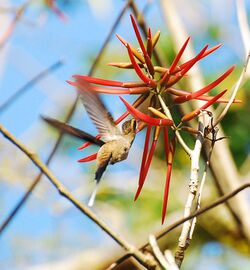
| |
| Costa Rican swift | Chaetura fumosa | 20,000-49,999[60] | LC[60] | Estimate is for mature individuals only. Population assumed stable due to absence of declines/threats.[60] | 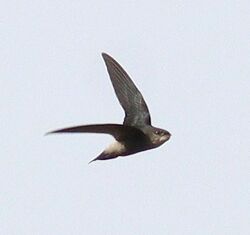
| |
| White-chinned swift | Cypseloides cryptus | 20,000-49,999[61] | LC[61] | Estimate is for mature individuals only. Downward trend is due to habitat loss.[61] | ||
| Beautiful sheartail | Calothorax pulcher | 20,000-49,999[62] | LC[62] | Estimate is for mature individuals only.[62] | 
| |
| Black-crested coquette | Lophornis helenae | 20,000-49,999[63] | LC[63] | Estimate is for mature individuals only.[63] | 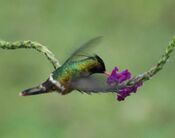
| |
| Cozumel emerald | Cynanthus forficatus | 20,000-49,999[64] | LC[64] | Estimate is for mature individuals only.[64] | 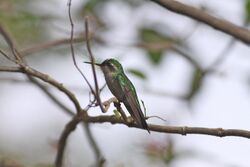
| |
| Emerald-chinned hummingbird | Abeillia abeillei | 20,000-49,999[65] | LC[65] | This estimate is for mature individuals only. Trend has not been investigated, but it is suspected to be in a decline due to habitat loss.[65] | 
| |
| Garnet-throated hummingbird | Lamprolaima rhami | 20,000-49,999[66] | LC[66] | Estimate is for mature individuals only.[66] | 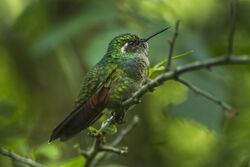
| |
| Great swallow-tailed swift | Panyptila sanctihieronymi | 20,000-49,999[67] | LC[67] | Estimate is for mature individuals only.[67] | 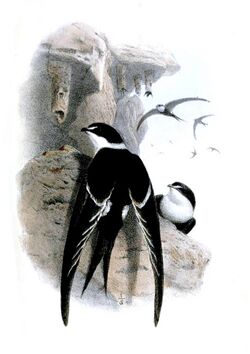
| |
| Rufous sabrewing | Pampa rufus | 20,000-49,999[68] | LC[68] | Estimate is for mature individuals only.[68] | 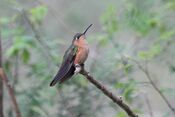
| |
| Slender sheartail | Doricha enicura | 20,000-49,999[69] | LC[69] | Estimate is for mature individuals.[69] | 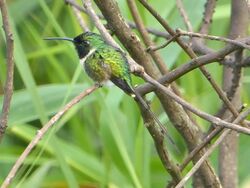
| |
| Sparkling-tailed woodstar | Tilmatura dupontii | 20,000-49,999[70] | LC[70] | Estimate is for mature individuals only.[70] | 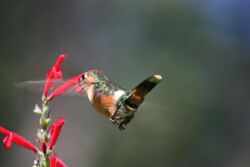
| |
| White-fronted swift | Cypseloides storeri | 20,000-49,999[71] | DD[71] | Unknown[71] | This estimate was made in 2019. Trend is unknown due to uncertainties regarding the species habitat requirements.[71] | |
| Wine-throated hummingbird | Selasphorus ellioti | 20,000-49,999[72] | LC[72] | Estimate is for mature individuals only.[72] | 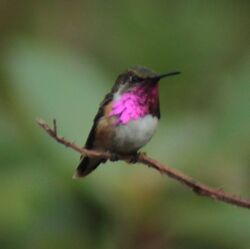
| |
| Xantus's hummingbird | Basilinna xantusii | 20,000-49,999[73] | LC[73] | Estimate is for mature individuals only.[73] | 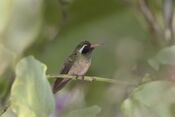
| |
| Bee hummingbird | Mellisuga helenae | 22,000-66,000[74] | NT[74] | Estimate for mature individuals only.[74] | 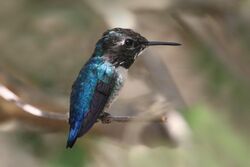
| |
| Plain swift | Apus unicolor | 22,500-60,000[75] | LC[75] | Unknown[75] | Breeding population is confined to Europe, estimated to be 15,000-40,000 mature individuals.[75] | 
|
| Hooded visorbearer | Augastes lumachella | 35,000-100,000[76] | NT[76] | Estimate is for mature individuals only, and is calculated from mapped range and percent of range occupied.[76] | 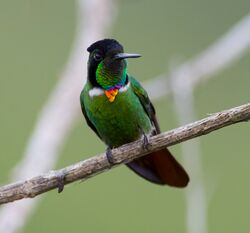
| |
| Dot-eared coquette | Lophornis gouldii | 43,000-563,000[77] | NT[77] | Tentative estimate. Equal to 28,000-376,000 mature individuals.[77] | 
| |
| White-tailed sabrewing | Campylopterus ensipennis | 50,000-99,999[78] | NT[78] | Estimate is for mature individuals only.[78] | 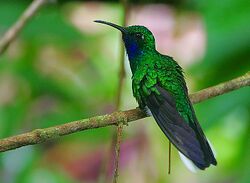
| |
| Charming hummingbird | Polyerata decora | 50,000-499,999[79] | LC[79] | Estimate is for mature individuals only.[79] | 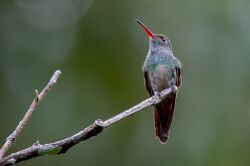
| |
| Sapphire-throated hummingbird | Chrysuronia coeruleogularis | 50,000-499,999[80] | LC[80] | Estimate is for mature individuals only.[80] | 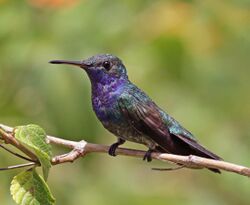
| |
| Snowy-bellied hummingbird | Saucerottia edward | 50,000-499,999[81] | LC[81] | Estimate is for mature individuals only.[81] | 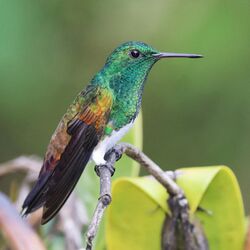
| |
| Blue-tailed hummingbird | Saucerottia cyanura | 50,000-499,999[82] | LC[82] | Estimate is for mature individuals only.[82] | 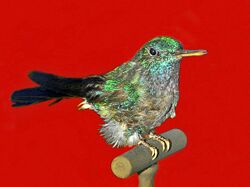
| |
| Scaly-breasted hummingbird | Phaeochroa cuvierii | 50,000-499,999[83] | LC[83] | Estimate is for mature individuals only.[83] | 
| |
| Black-bellied hummingbird | Eupherusa nigriventris | 50,000-499,999[84] | LC[84] | Estimate is for mature individuals only.[84] | 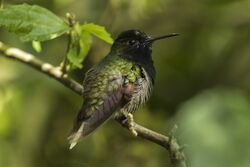
| |
| Snowcap | Microchera albocoronata | 50,000-499,999[85] | LC[85] | Estimate is for mature individuals only.[85] | 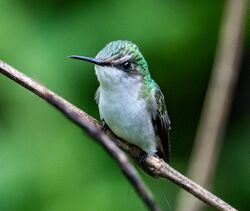
| |
| Blue-throated goldentail | Cholrestes eliciae | 50,000-499,999[86] | LC[86] | Estimate is for mature individuals only.[86] | 
| |
| Garden emerald | Chlorostilbon assimilis | 50,000-499,999[87] | LC[87] | Estimate is for mature individuals only.[87] | 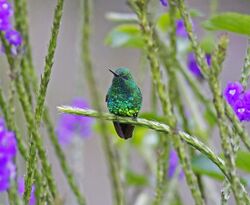
| |
| Bumblebee hummingbird | Selasphorus heloisa | 50,000-499,999[88] | LC[88] | Estimate for mature individuals only.[88] | 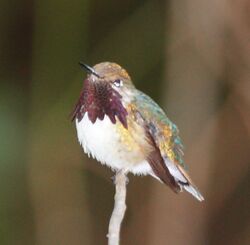
| |
| Violet-bellied hummingbird | Chlorestes julie | 50,000-499,999[89] | LC[89] | Estimate is for mature individuals only.[89] | 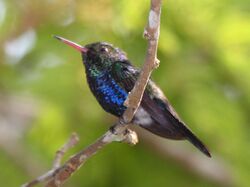
| |
| Amethyst-throated mountaingem | Lampornis amethystinus | 50,000-499,999[90] | LC[90] | Estimate is for mature individuals only.[90] | 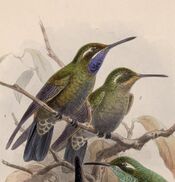
| |
| Purple-throated mountain-gem | Lampornis calolaemus | 50,000-499,999[91] | LC[91] | Estimate is for mature individuals only.[91] | 
| |
| Fiery-throated hummingbird | Panterpe insignis | 50,000-499,999[92] | LC[92] | Estimate is for mature individuals only.[92] | 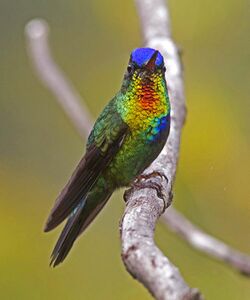
| |
| Rufous-crested coquette | Lophornis delattrei | 50,000-499,999[93] | LC[93] | Estimate is for mature individuals only.[93] | 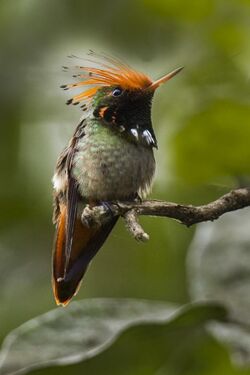
| |
| White-whiskered hermit | Phaethornis yaruqui | 50,000-499,999[94] | LC[94] | Estimate is for mature individuals only.[94] | 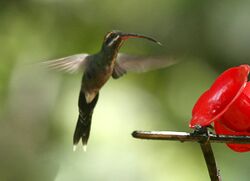
| |
| Chapman's swift | Chaetura chapmani | 50,000-499,999[95] | LC[95] | Estimate is for mature individuals only.[95] | 
| |
| White-tipped sicklebill | Eutoxeres aquila | 50,000-499,999[96] | LC[96] | Estimate is for mature individuals only.[96] | 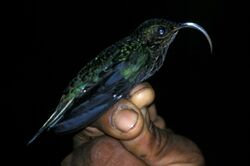
| |
| Dusky hummingbird | Phaeoptila sordidus | 50,000-499,999[97] | LC[97] | Estimate is for mature individuals only.[97] | 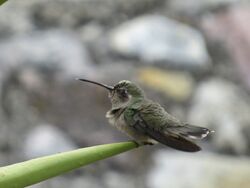
| |
| Golden-crowned emerald | Cyanthus auriceps | 50,000-499,999[98] | LC[98] | Estimate is for mature individuals only.[98] | 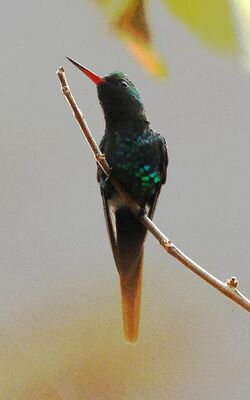
| |
| Green-throated mountaingem | Lampornis viridipallens | 50,000-499,999[99] | LC[99] | Estimate is for mature individuals only.[99] | 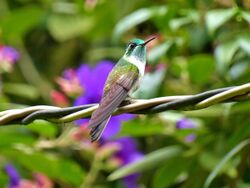
| |
| Plain-capped starthroat | Heliomaster constantii | 50,000-499,999[100] | LC[100] | Estimate is for mature individuals only.[100] | 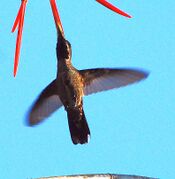
| |
| Purple-crowned fairy | Heliothryx barroti | 50,000-499,999[101] | LC[101] | No mature individuals estimate is given.[101] | 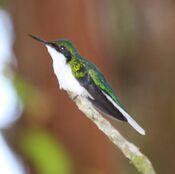
| |
| Stripe-tailed hummingbird | Eupherusa eximia | 50,000-499,999[102] | LC[102] | Estimate is for mature individuals only.[102] | 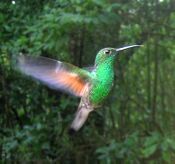
| |
| Stripe-throated hermit | Phaethornis striigularis | 50,000-499,999[103] | LC[103] | Estimate is for mature individuals only.[103] | 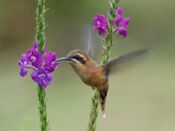
| |
| Violet sabrewing | Campylopterus hemileucurus | 50,000-499,999[104] | LC[104] | Estimate is for mature individuals only.[104] | 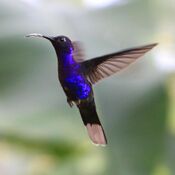
| |
| White-naped swift | Streptoprocne semicollaris | 50,000-499,999[105] | LC[105] | Estimate is for mature individuals only (2019).[105] | 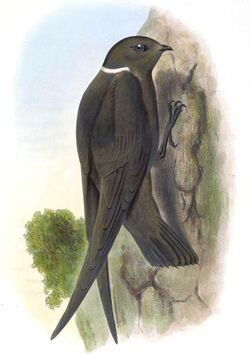
| |
| Tooth-billed hummingbird | Androdon aequatorialis | 78,000-130,000[106] | LC[106] | Estimate is calculated from density and habitat range. Equates 52,000-87,000 mature individuals.[106] | 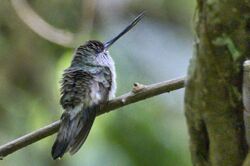
| |
| Black swift | Cypseloides niger | 170,000[107] | VU[107] | This estimate is for mature individuals only, and was made in 2019.[107] | 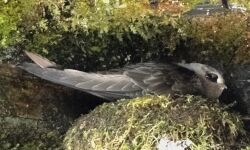
| |
| Lucifer hummingbird | Calothorax lucifer | 200,000[108] | LC[108] | Estimate is for mature individuals only.[108] | 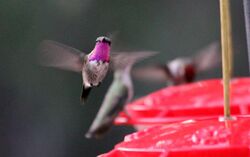
| |
| Saw-billed hermit | Ramphodon naevius | 262,000-2,560,000[109] | LC[109] | Tentative estimate based on habitat size. Mature individuals estimated at 175,000-1,710,000.[109] | 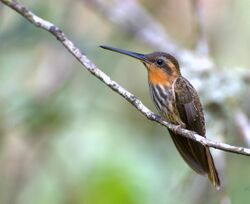
| |
| Greenish puffleg | Haplophaedia aureliae | 336,000-570,000[110] | LC[110] | Estimate is for mature individuals only. Equal to 168,000-285,000 pairs.[110] | 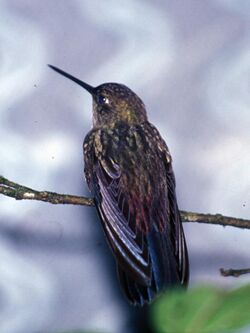
| |
| Blue-chested hummingbird | Polyerata amabilis | 500,000-4,999,999[111] | LC[111] | Estimate is for mature individuals only.[111] | 
| |
| Steely-vented hummingbird | Saucerottia saucerottei | 500,000-4,999,999[112] | LC[112] | Estimate is for mature individuals only.[112] | 
| |
| Azure-crowned hummingbird | Saucerottia cyanocephala | 500,000-4,999,999[113] | LC[113] | Estimate is for mature individuals only.[113] | 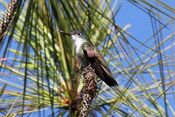
| |
| Bronze-tailed plumeleteer | Chalybura urochrysia | 500,000-4,999,999[114] | LC[114] | Estimate is for mature individuals only.[114] | 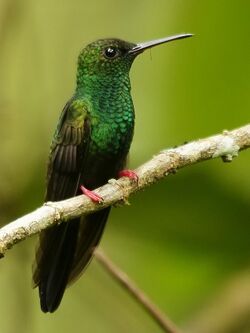
| |
| Violet-headed hummingbird | Klais guimeti | 500,000-4,999,999[115] | LC[115] | Estimate is for mature individuals only.[115] | 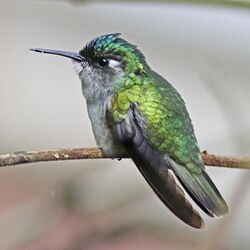
| |
| Canivet's emerald | Cynanthus canivetii | 500,000-4,999,999[116] | LC[116] | Estimate is for mature individuals only.[116] | 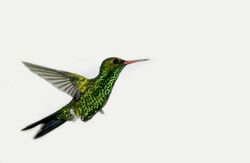
| |
| Green-crowned brilliant | Heliodoxa jacula | 500,000-4,999,999[117] | LC[117] | Estimate is for mature individuals only.[117] | 
| |
| Green-breasted mango | Anthracothorax prevostii | 500,000-4,999,999[118] | LC[118] | [118] |
Estimate is for mature individuals only.[118] | 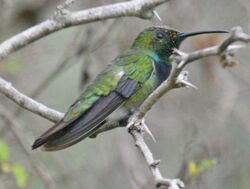
|
| Brown violet-ear | Colibri delphinae | 500,000-4,999,999[119] | LC[119] | Estimate is for mature individuals only.[119] | 
| |
| Green-fronted lancebill | Doryfera ludovicae | 500,000-4,999,999[120] | LC[120] | Estimate is for mature individuals only.[120] | 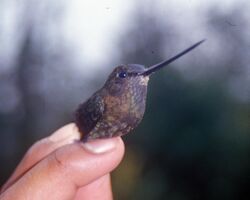
| |
| Green hermit | Phaethornis guy | 500,000-4,999,999[121] | LC[121] | Estimate is for mature individuals only.[121] | 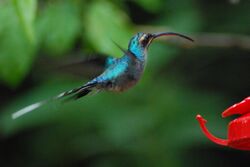
| |
| Pale-bellied hermit | Phaethornis anthophilus | 500,000-4,999,999[122] | LC[122] | Estimate is for mature individuals only.[122] | 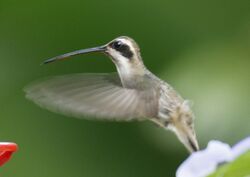
| |
| Band-tailed barbthroat | Threnetes ruckeri | 500,000-4,999,999[123] | LC[123] | Estimate is for mature individuals only.[123] | 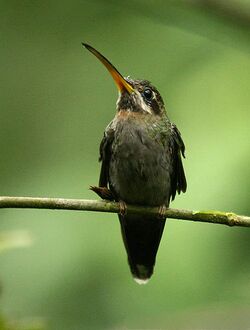
| |
| Chestnut-collared swift | Streptoprocne rutila | 500,000-4,999,999[124] | LC[124] | This estimate is for mature individuals only.[124] | 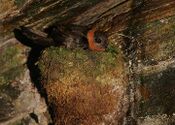
| |
| Bronzy hermit | Glaucis aeneus | 500,000-4,999,999[125] | LC[125] | Estimate is for mature individuals only.[125] | 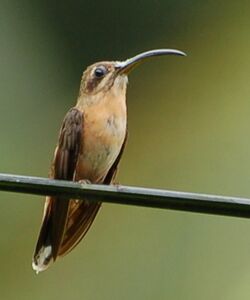
| |
| Cinnamon hummingbird | Amazilia rutila | 500,000-4,999,999[126] | LC[126] | Estimate is for mature individuals only.[126] | 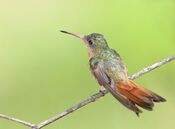
| |
| Green violetear | Colibri thalassinus | 500 000 – 4 999 999[127] | LC[127] | Unknown[127] | 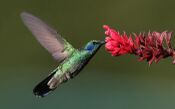
| |
| Lesser swallow-tailed swift | Panyptila cayennensis | 500,000-4,999,999[128] | LC[128] | Estimate is for mature individuals only.[128] | 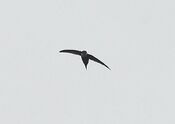
| |
| Long-billed starthroat | Heliomaster longirostris | 500,000-4,999,999[129] | LC[129] | Estimate is for mature individuals only.[129] | 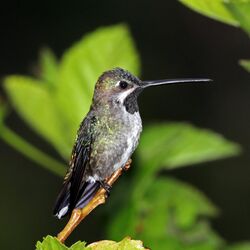
| |
| White-bellied emerald | Amazilia candida | 500,000-4,999,999[130] | LC[130] | Estimate is for mature individuals only.[130] | 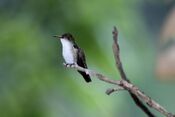
| |
| Buff-bellied hummingbird | Amazilia yucatanensis | 610,000[131] | LC[131] | Unknown[131] | Estimate is for mature individuals only.[131] | 
|
| Pallid swift | Apus pallidus | 800,000-1,499,999[132] | LC[132] | Preliminary estimate extrapolated from European data, which is home to 126,000-213,000 mature individuals.[132] | 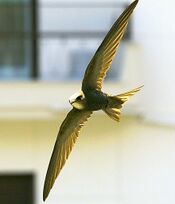
| |
| Vaux's swift | Chaetura vauxi | 860,000[133] | LC[133] | Estimate is for mature individuals only.[133] | 
| |
| Alpine swift | Tachymarptis melba | 1,000,000-2,499,999[134] | LC[134] | Estimate for mature individuals only. Preliminary estimate. European population estimated at 302,000-653,000 mature individuals.[134] | 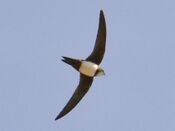
| |
| Allen's hummingbird | Selasphorus sasin | 1,500,000[135] | LC[135] | Estimate is for mature individuals only.[135] | 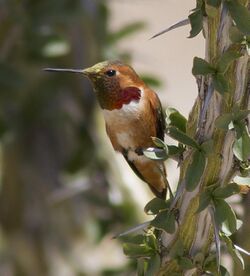
| |
| Berylline hummingbird | Saucerottia beryllina | 2,000,000[136] | LC[136] | Estimate is for mature individuals only.[136] | 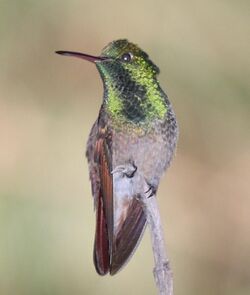
| |
| White-eared hummingbird | Basilinna leucotis | 2,000,000[137] | LC[137] | Estimate is for mature individuals only.[137] | 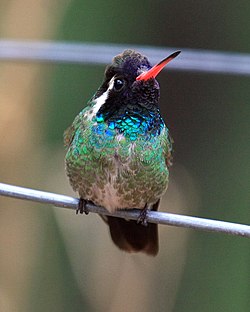
| |
| Blue-throated hummingbird | Lampornis clemenciae | 2,000,000[138] | LC[138] | Estimate is for mature individuals only.[138] | 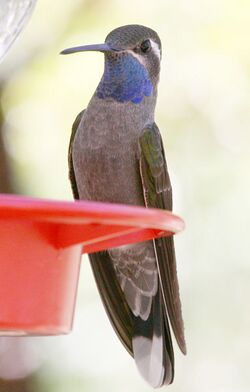
| |
| Magnificent hummingbird | Eugenes fulgens | 2,000,000[139] | LC[139] | Estimate is for mature individuals only.[139] | 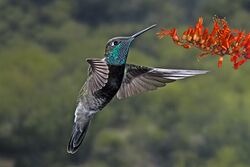
| |
| White-throated swift | Aeronautes saxatalis | 3,200,000[140] | LC[140] | Estimate is for mature individuals only.[140] | 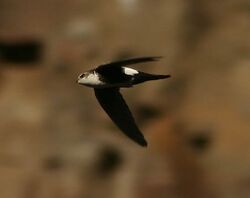
| |
| Costa's hummingbird | Calypte costae | 3,400,000[141] | LC[141] | Estimate is for mature individuals only.[141] | 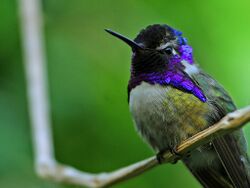
| |
| Grey-breasted sabrewing | Campylopterus largipennis | 4,000,000-20,000,000[142] | LC[142] | Tentative estimate from density and range, equal to 3,000,000-13,000,000 mature individuals.[142] | 
| |
| Calliope hummingbird | Selasphorus calliope | 4,500,000[143] | LC[143] | Estimate is for mature individuals only.[143] | 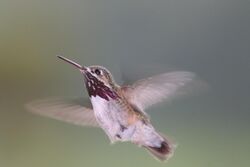
| |
| Rufous-tailed hummingbird | Amazilia tzacatl | 5,000,000-50,000,000[144] | LC[144] | Estimate is for mature individuals only.[144] | 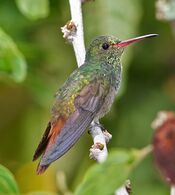
| |
| Black-throated mango | Anthracothorax nigricollis | 5,000,000-50,000,000[145] | LC[145] | Estimate is for mature individuals only.[145] | 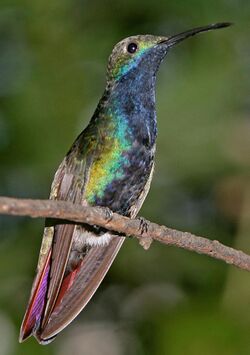
| |
| Rufous-breasted hermit | Glaucis hirsutus | 5,000,000-50,000,000[146] | LC[146] | Estimate is for mature individuals only.[146] | 
| |
| White-collared swift | Streptoprocne zonaris | 5,000,000-50,000,000[147] | LC[147] | This estimate is for mature individuals only (made in 2019). Decline due to habitat loss.[147] | 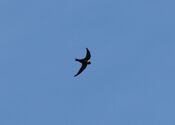
| |
| White-necked jacobin | Florisuga mellivora | 5,000,000-50,000,000[148] | LC[148] | Estimate is for mature individuals only.[148] | 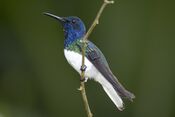
| |
| Short-tailed swift | Chaetura brachyura | 5,000,000-50,000,000[149] | LC[149] | Estimate is for mature individuals only.[149] | 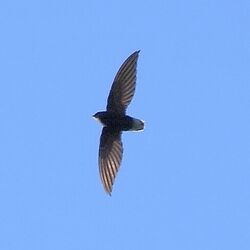
| |
| Black-chinned hummingbird | Archilochus alexandri | 8,800,000[150] | LC[150] | Estimate is for mature individuals only.[150] | 
| |
| Anna's hummingbird | Calypte anna | 9,600,000[151] | LC[151] | Estimate is for mature individuals only.[151] | 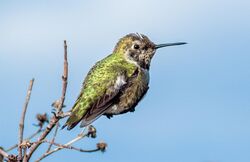
| |
| Broad-tailed hummingbird | Selasphorus platycercus | 9,800,000[88] | LC[88] | Estimate is for mature individuals only.[88] | 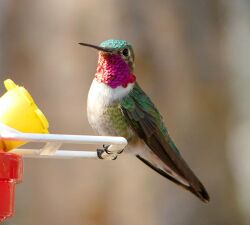
| |
| Chimney swift | Chaetura pelagica | 15,000,000[152] | VU[152] | Estimate for mature individuals is 7,700,000 (2016 survery).[152] | 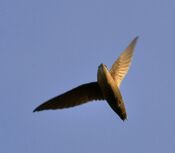
| |
| Rufous hummingbird | Selasphorus rufus | 22,000,000[153] | NT[153] | Estimate is for mature individuals only.[153] | 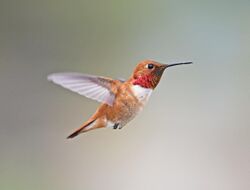
| |
| Ruby-throated hummingbird | Archilochus colubris | 36,000,000[154] | LC[154] | Estimate is for mature individuals only.[154] | 
| |
| Grey-rumped swift | Chaetura cinereiventris | 50,000,000[155] | LC[155] | This estimate is for mature individuals only.[155] | 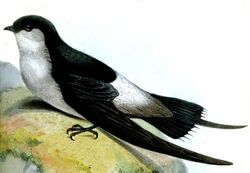
| |
| Common swift | Apus apus | 95,000,000-164,999,999[156] | LC[156] | Preliminary estimate is for mature individuals. European population estimated at 38,200,000-65,000,000 mature individuals.[156] | 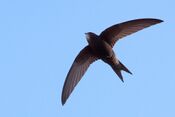
|
See also
- Lists of birds by population
- Lists of organisms by population
References
- ↑ 1.0 1.1 1.2 1.3 IUCN (2020-08-18). "Eriocnemis godini: BirdLife International: The IUCN Red List of Threatened Species 2020: e.T22687922A182244989" (in en). IUCN Red List of Threatened Species 2020-08-18. doi:10.2305/iucn.uk.2020-3.rlts.t22687922a182244989.en. https://www.iucnredlist.org/species/22687922/182244989.
- ↑ 2.0 2.1 2.2 2.3 IUCN (2020-08-06). "Campylopterus phainopeplus: BirdLife International: The IUCN Red List of Threatened Species 2020: e.T22687086A181107620" (in en). IUCN Red List of Threatened Species 2020-08-06. doi:10.2305/iucn.uk.2020-3.rlts.t22687086a181107620.en. https://www.iucnredlist.org/species/22687086/181107620.
- ↑ 3.0 3.1 3.2 3.3 IUCN (2016-10-01). "Oxypogon cyanolaemus: BirdLife International: The IUCN Red List of Threatened Species 2018: e.T22726798A126028398" (in en). IUCN Red List of Threatened Species 2016-10-01. doi:10.2305/iucn.uk.2018-2.rlts.t22726798a126028398.en. https://www.iucnredlist.org/species/22726798/126028398.
- ↑ 4.0 4.1 4.2 4.3 IUCN (2021-08-03). "Oreotrochilus cyanolaemus: BirdLife International: The IUCN Red List of Threatened Species 2021: e.T200250452A200270409" (in en). IUCN Red List of Threatened Species 2021-08-03. doi:10.2305/iucn.uk.2021-3.rlts.t200250452a200270409.en. https://www.iucnredlist.org/species/200250452/200270409.
- ↑ 5.0 5.1 5.2 5.3 IUCN (2020-08-06). "Eriocnemis nigrivestis: BirdLife International: The IUCN Red List of Threatened Species 2020: e.T22687909A173319425" (in en). IUCN Red List of Threatened Species 2020-08-06. doi:10.2305/iucn.uk.2020-3.rlts.t22687909a173319425.en. https://www.iucnredlist.org/species/22687909/173319425.
- ↑ 6.0 6.1 6.2 6.3 IUCN (2018-08-07). "Eriocnemis isabellae: BirdLife International: The IUCN Red List of Threatened Species 2018: e.T22735457A126225505" (in en). IUCN Red List of Threatened Species 2018-08-07. doi:10.2305/iucn.uk.2018-2.rlts.t22735457a126225505.en. https://www.iucnredlist.org/species/22735457/126225505.
- ↑ 7.0 7.1 7.2 7.3 IUCN (2020-11-23). "Oxypogon stuebelii: BirdLife International: The IUCN Red List of Threatened Species 2021: e.T22726810A190694196" (in en). IUCN Red List of Threatened Species 2020-11-23. doi:10.2305/iucn.uk.2021-3.rlts.t22726810a190694196.en. https://www.iucnredlist.org/species/22726810/190694196.
- ↑ 8.0 8.1 8.2 8.3 IUCN (2016-10-01). "Apus acuticauda: BirdLife International: The IUCN Red List of Threatened Species 2017: e.T22686853A123787702" (in en). IUCN Red List of Threatened Species 2016-10-01. doi:10.2305/iucn.uk.2017-3.rlts.t22686853a117600944.en. https://www.iucnredlist.org/species/22686853/117600944.
- ↑ 9.0 9.1 9.2 9.3 IUCN (2017-10-01). "Eriocnemis mirabilis: BirdLife International: The IUCN Red List of Threatened Species 2017: e.T22687939A118473368" (in en). IUCN Red List of Threatened Species 2017-10-01. doi:10.2305/iucn.uk.2017-3.rlts.t22687939a118473368.en. https://www.iucnredlist.org/species/22687939/118473368.
- ↑ 10.0 10.1 10.2 10.3 IUCN (2020-07-16). "Coeligena orina: BirdLife International: The IUCN Red List of Threatened Species 2020: e.T22687828A179510387" (in en). IUCN Red List of Threatened Species 2020-07-16. doi:10.2305/iucn.uk.2020-3.rlts.t22687828a179510387.en. https://www.iucnredlist.org/species/22687828/179510387.
- ↑ 11.0 11.1 11.2 11.3 IUCN (2020-12-08). "Amazilia lilliae: BirdLife International: The IUCN Red List of Threatened Species 2021: e.T22687417A192202266" (in en). IUCN Red List of Threatened Species 2020-12-08. doi:10.2305/iucn.uk.2021-3.rlts.t22687417a192202266.en. https://www.iucnredlist.org/species/22687417/192202266.
- ↑ 12.0 12.1 12.2 12.3 IUCN (2020-08-11). "Eulidia yarrellii: BirdLife International: The IUCN Red List of Threatened Species 2020: e.T22688244A181468935" (in en). IUCN Red List of Threatened Species 2020-08-11. doi:10.2305/iucn.uk.2020-3.rlts.t22688244a181468935.en. https://www.iucnredlist.org/species/22688244/181468935.
- ↑ 13.0 13.1 13.2 13.3 IUCN (2020-08-04). "Aerodramus sawtelli: BirdLife International: The IUCN Red List of Threatened Species 2020: e.T22686581A180897346" (in en). IUCN Red List of Threatened Species 2020-08-04. doi:10.2305/iucn.uk.2020-3.rlts.t22686581a180897346.en. https://www.iucnredlist.org/species/22686581/180897346.
- ↑ 14.0 14.1 14.2 14.3 IUCN (2020-07-13). "Taphrolesbia griseiventris: BirdLife International: The IUCN Red List of Threatened Species 2020: e.T22688049A179183928" (in en). IUCN Red List of Threatened Species 2020-07-13. doi:10.2305/iucn.uk.2020-3.rlts.t22688049a179183928.en. https://www.iucnredlist.org/species/22688049/179183928.
- ↑ 15.0 15.1 15.2 15.3 IUCN (2016-10-01). "Loddigesia mirabilis: BirdLife International: The IUCN Red List of Threatened Species 2016: e.T22688130A93183168" (in en). IUCN Red List of Threatened Species 2016-10-01. doi:10.2305/iucn.uk.2016-3.rlts.t22688130a93183168.en. https://www.iucnredlist.org/species/22688130/93183168.
- ↑ 16.0 16.1 16.2 16.3 IUCN (2018-08-07). "Lophornis brachylophus: BirdLife International: The IUCN Red List of Threatened Species 2018: e.T22687196A130649157" (in en). IUCN Red List of Threatened Species 2018-08-07. doi:10.2305/iucn.uk.2018-2.rlts.t22687196a130649157.en. https://www.iucnredlist.org/species/22687196/130649157.
- ↑ 17.0 17.1 17.2 17.3 IUCN (2019-08-07). "Anthocephala floriceps: BirdLife International: The IUCN Red List of Threatened Species 2019: e.T154807906A154812309" (in en). IUCN Red List of Threatened Species 2019-08-07. doi:10.2305/iucn.uk.2019-3.rlts.t154807906a154812309.en. https://www.iucnredlist.org/species/154807906/154812309.
- ↑ 18.0 18.1 18.2 18.3 IUCN (2016-10-01). "Thalurania watertonii: BirdLife International: The IUCN Red List of Threatened Species 2017: e.T22687402A119410693" (in en). IUCN Red List of Threatened Species 2016-10-01. doi:10.2305/iucn.uk.2017-3.rlts.t22687402a119410693.en. https://www.iucnredlist.org/species/22687402/119410693.
- ↑ 19.0 19.1 19.2 19.3 IUCN (2020-08-30). "Cynanthus lawrencei: BirdLife International: The IUCN Red List of Threatened Species 2020: e.T22726267A178536555" (in en). IUCN Red List of Threatened Species 2020-08-30. doi:10.2305/iucn.uk.2020-3.rlts.t22726267a178536555.en. https://www.iucnredlist.org/species/22726267/178536555.
- ↑ 20.0 20.1 20.2 20.3 IUCN (2018-08-07). "Eupherusa cyanophrys: BirdLife International: The IUCN Red List of Threatened Species 2018: e.T22687635A131123580" (in en). IUCN Red List of Threatened Species 2018-08-07. doi:10.2305/iucn.uk.2018-2.rlts.t22687635a131123580.en. https://www.iucnredlist.org/species/22687635/131123580.
- ↑ 21.0 21.1 21.2 21.3 IUCN (2016-10-01). "Metallura baroni: BirdLife International: The IUCN Red List of Threatened Species 2016: e.T22687993A93178854" (in en). IUCN Red List of Threatened Species 2016-10-01. doi:10.2305/iucn.uk.2016-3.rlts.t22687993a93178854.en. https://www.iucnredlist.org/species/22687993/93178854.
- ↑ 22.0 22.1 22.2 22.3 IUCN (2019-08-07). "Anthocephala berlepschi: BirdLife International: The IUCN Red List of Threatened Species 2020: e.T154809350A176036352" (in en). IUCN Red List of Threatened Species 2019-08-07. doi:10.2305/iucn.uk.2020-3.rlts.t154809350a176036352.en. https://www.iucnredlist.org/species/154809350/176036352.
- ↑ 23.0 23.1 23.2 23.3 IUCN (2020-08-31). "Aglaeactis aliciae: BirdLife International: The IUCN Red List of Threatened Species 2020: e.T22687794A172262597" (in en). IUCN Red List of Threatened Species 2020-08-31. doi:10.2305/iucn.uk.2020-3.rlts.t22687794a172262597.en. https://www.iucnredlist.org/species/22687794/172262597.
- ↑ 24.0 24.1 24.2 24.3 IUCN (2020-07-22). "Chaetocercus berlepschi: BirdLife International: The IUCN Red List of Threatened Species 2020: e.T22688279A179854329" (in en). IUCN Red List of Threatened Species 2020-07-22. doi:10.2305/iucn.uk.2020-3.rlts.t22688279a179854329.en. https://www.iucnredlist.org/species/22688279/179854329.
- ↑ 25.0 25.1 25.2 25.3 IUCN (2020-08-03). "Selasphorus ardens: BirdLife International: The IUCN Red List of Threatened Species 2020: e.T22688308A180785009" (in en). IUCN Red List of Threatened Species 2020-08-03. doi:10.2305/iucn.uk.2020-3.rlts.t22688308a180785009.en. https://www.iucnredlist.org/species/22688308/180785009.
- ↑ 26.0 26.1 26.2 26.3 IUCN (2020-07-15). "Sephanoides fernandensis: BirdLife International: The IUCN Red List of Threatened Species 2020: e.T22687863A179402328" (in en). IUCN Red List of Threatened Species 2020-07-15. doi:10.2305/iucn.uk.2020-3.rlts.t22687863a179402328.en. https://www.iucnredlist.org/species/22687863/179402328.
- ↑ 27.0 27.1 27.2 27.3 IUCN (2020-08-12). "Chaetura andrei: BirdLife International: The IUCN Red List of Threatened Species 2020: e.T154632117A181593260" (in en). IUCN Red List of Threatened Species 2020-08-12. doi:10.2305/iucn.uk.2020-3.rlts.t154632117a181593260.en. https://www.iucnredlist.org/species/154632117/181593260.
- ↑ 28.0 28.1 28.2 28.3 IUCN (2020-06-23). "Aerodramus elaphrus: BirdLife International: The IUCN Red List of Threatened Species 2021: e.T22686507A177907869" (in en). IUCN Red List of Threatened Species 2020-06-23. doi:10.2305/iucn.uk.2021-3.rlts.t22686507a177907869.en. https://www.iucnredlist.org/species/22686507/177907869.
- ↑ 29.0 29.1 29.2 29.3 IUCN (2020-02-17). "Amazilia boucardi: BirdLife International: The IUCN Red List of Threatened Species 2020: e.T22687562A168615870" (in en). IUCN Red List of Threatened Species 2020-02-17. doi:10.2305/iucn.uk.2020-3.rlts.t22687562a168615870.en. https://www.iucnredlist.org/species/22687562/168615870.
- ↑ 30.0 30.1 30.2 30.3 IUCN (2016-10-01). "Aglaiocercus berlepschi: BirdLife International: The IUCN Red List of Threatened Species 2016: e.T22733891A95068539" (in en). IUCN Red List of Threatened Species 2016-10-01. doi:10.2305/iucn.uk.2016-3.rlts.t22733891a95068539.en. https://www.iucnredlist.org/species/22733891/95068539.
- ↑ 31.0 31.1 31.2 31.3 IUCN (2016-10-01). "Aerodramus bartschi: BirdLife International: The IUCN Red List of Threatened Species 2016: e.T22728583A94990600" (in en). IUCN Red List of Threatened Species 2016-10-01. doi:10.2305/iucn.uk.2016-3.rlts.t22728583a94990600.en. https://www.iucnredlist.org/species/22728583/94990600.
- ↑ 32.0 32.1 32.2 32.3 IUCN (2021-07-05). "Glaucis dohrnii: BirdLife International: The IUCN Red List of Threatened Species 2021: e.T22687026A137470206" (in en). IUCN Red List of Threatened Species 2021-07-05. doi:10.2305/iucn.uk.2021-3.rlts.t22687026a137470206.en. https://www.iucnredlist.org/species/22687026/137470206.
- ↑ 33.0 33.1 33.2 33.3 "Campylopterus curvipennis: BirdLife International". 2020-10-13. http://dx.doi.org/10.2305/iucn.uk.2021-3.rlts.t22727993a167043838.en.
- ↑ 34.0 34.1 34.2 34.3 IUCN (2016-10-01). "Hylonympha macrocerca: BirdLife International: The IUCN Red List of Threatened Species 2016: e.T22687749A93167384" (in en). IUCN Red List of Threatened Species 2016-10-01. doi:10.2305/iucn.uk.2016-3.rlts.t22687749a93167384.en. https://www.iucnredlist.org/species/22687749/93167384.
- ↑ 35.0 35.1 35.2 35.3 IUCN (2021-11-02). "Heliangelus regalis: BirdLife International: The IUCN Red List of Threatened Species 2022: e.T22687901A210187058" (in en). IUCN Red List of Threatened Species 2021-11-02. doi:10.2305/iucn.uk.2022-1.rlts.t22687901a210187058.en. https://www.iucnredlist.org/species/22687901/210187058.
- ↑ 36.0 36.1 36.2 36.3 IUCN (2021-08-03). "Chaetocercus bombus: BirdLife International: The IUCN Red List of Threatened Species 2021: e.T22688257A181597476" (in en). IUCN Red List of Threatened Species 2021-08-03. doi:10.2305/iucn.uk.2021-3.rlts.t22688257a181597476.en. https://www.iucnredlist.org/species/22688257/181597476.
- ↑ 37.0 37.1 37.2 37.3 IUCN (2020-08-30). "Doricha eliza: BirdLife International: The IUCN Red List of Threatened Species 2021: e.T22688175A178592944" (in en). IUCN Red List of Threatened Species 2020-08-30. doi:10.2305/iucn.uk.2021-3.rlts.t22688175a178592944.en. https://www.iucnredlist.org/species/22688175/178592944.
- ↑ 38.0 38.1 38.2 38.3 IUCN (2016-10-01). "Metallura odomae: BirdLife International: The IUCN Red List of Threatened Species 2016: e.T22687998A93179183" (in en). IUCN Red List of Threatened Species 2016-10-01. doi:10.2305/iucn.uk.2016-3.rlts.t22687998a93179183.en. https://www.iucnredlist.org/species/22687998/93179183.
- ↑ 39.0 39.1 39.2 39.3 IUCN (2020-07-23). "Amazilia luciae: BirdLife International: The IUCN Red List of Threatened Species 2020: e.T22687529A179937732" (in en). IUCN Red List of Threatened Species 2020-07-23. doi:10.2305/iucn.uk.2020-3.rlts.t22687529a179937732.en. https://www.iucnredlist.org/species/22687529/179937732.
- ↑ 40.0 40.1 40.2 40.3 IUCN (2019-08-12). "Amazilia castaneiventris: BirdLife International: The IUCN Red List of Threatened Species 2019: e.T22687614A156112287" (in en). IUCN Red List of Threatened Species 2019-08-12. doi:10.2305/iucn.uk.2019-3.rlts.t22687614a156112287.en. https://www.iucnredlist.org/species/22687614/156112287.
- ↑ 41.0 41.1 41.2 41.3 IUCN (2016-10-01). "Phaethornis koepckeae: BirdLife International: The IUCN Red List of Threatened Species 2016: e.T22686961A93133625" (in en). IUCN Red List of Threatened Species 2016-10-01. doi:10.2305/iucn.uk.2016-3.rlts.t22686961a93133625.en. https://www.iucnredlist.org/species/22686961/93133625.
- ↑ 42.0 42.1 42.2 42.3 IUCN (2019-07-12). "Aerodramus francicus: BirdLife International: The IUCN Red List of Threatened Species 2019: e.T22686511A154346114" (in en). IUCN Red List of Threatened Species 2019-07-12. doi:10.2305/iucn.uk.2019-3.rlts.t22686511a154346114.en. https://www.iucnredlist.org/species/22686511/154346114.
- ↑ 43.0 43.1 43.2 43.3 IUCN (2018-08-07). "Thalurania ridgwayi: BirdLife International: The IUCN Red List of Threatened Species 2018: e.T22687383A131473808" (in en). IUCN Red List of Threatened Species 2018-08-07. doi:10.2305/iucn.uk.2018-2.rlts.t22687383a131473808.en. https://www.iucnredlist.org/species/22687383/131473808.
- ↑ 44.0 44.1 44.2 44.3 IUCN (2016-10-01). "Cypseloides rothschildi: BirdLife International: The IUCN Red List of Threatened Species 2016: e.T22686450A93112177" (in en). IUCN Red List of Threatened Species 2016-10-01. doi:10.2305/iucn.uk.2016-3.rlts.t22686450a93112177.en. https://www.iucnredlist.org/species/22686450/93112177.
- ↑ 45.0 45.1 45.2 45.3 IUCN (2021-07-02). "Eupherusa poliocerca: BirdLife International: The IUCN Red List of Threatened Species 2021: e.T22687627A178539079" (in en). IUCN Red List of Threatened Species 2021-07-02. doi:10.2305/iucn.uk.2021-3.rlts.t22687627a178539079.en. https://www.iucnredlist.org/species/22687627/178539079.
- ↑ 46.0 46.1 46.2 46.3 "Coeligena prunellei: BirdLife International". 2016-10-01. http://dx.doi.org/10.2305/iucn.uk.2016-3.rlts.t22687813a93170712.en.
- ↑ 47.0 47.1 47.2 47.3 IUCN (2021-07-02). "Oreotrochilus adela: BirdLife International: The IUCN Red List of Threatened Species 2021: e.T22687774A190530116" (in en). IUCN Red List of Threatened Species 2021-07-02. doi:10.2305/iucn.uk.2021-3.rlts.t22687774a190530116.en. https://www.iucnredlist.org/species/22687774/190530116.
- ↑ 48.0 48.1 48.2 48.3 "Amazilia humboldtii: BirdLife International". 2021-10-07. http://dx.doi.org/10.2305/iucn.uk.2022-1.rlts.t22733646a152636247.en.
- ↑ 49.0 49.1 49.2 49.3 IUCN (2020-10-13). "Elvira chionura: BirdLife International: The IUCN Red List of Threatened Species 2021: e.T22687643A167087646" (in en). IUCN Red List of Threatened Species 2020-10-13. doi:10.2305/iucn.uk.2021-3.rlts.t22687643a167087646.en. https://www.iucnredlist.org/species/22687643/167087646.
- ↑ 50.0 50.1 50.2 50.3 IUCN (2020-10-13). "Elvira cupreiceps: BirdLife International: The IUCN Red List of Threatened Species 2021: e.T22687646A167089035" (in en). IUCN Red List of Threatened Species 2020-10-13. doi:10.2305/iucn.uk.2021-3.rlts.t22687646a167089035.en. https://www.iucnredlist.org/species/22687646/167089035.
- ↑ 51.0 51.1 51.2 51.3 IUCN (2020-10-13). "Selasphorus scintilla: BirdLife International: The IUCN Red List of Threatened Species 2021: e.T22688305A167032072" (in en). IUCN Red List of Threatened Species 2020-10-13. doi:10.2305/iucn.uk.2021-3.rlts.t22688305a167032072.en. https://www.iucnredlist.org/species/22688305/167032072.
- ↑ 52.0 52.1 52.2 52.3 IUCN (2020-10-13). "Selasphorus flammula: BirdLife International: The IUCN Red List of Threatened Species 2021: e.T22688302A167031365" (in en). IUCN Red List of Threatened Species 2020-10-13. doi:10.2305/iucn.uk.2021-3.rlts.t22688302a167031365.en. https://www.iucnredlist.org/species/22688302/167031365.
- ↑ 53.0 53.1 53.2 53.3 "Calliphlox mitchellii: BirdLife International". 2012-05-01. http://dx.doi.org/10.2305/iucn.uk.2012-1.rlts.t22688163a40525130.en.
- ↑ 54.0 54.1 54.2 54.3 IUCN (2020-10-12). "Calliphlox bryantae: BirdLife International: The IUCN Red List of Threatened Species 2021: e.T22688153A167024506" (in en). IUCN Red List of Threatened Species 2020-10-12. doi:10.2305/iucn.uk.2021-3.rlts.t22688153a167024506.en. https://www.iucnredlist.org/species/22688153/167024506.
- ↑ 55.0 55.1 55.2 55.3 IUCN (2020-10-12). "Lampornis hemileucus: BirdLife International: The IUCN Red List of Threatened Species 2022: e.T22687680A167018960" (in en). IUCN Red List of Threatened Species 2020-10-12. doi:10.2305/iucn.uk.2022-1.rlts.t22687680a167018960.en. https://www.iucnredlist.org/species/22687680/167018960.
- ↑ 56.0 56.1 56.2 56.3 IUCN (2016-10-01). "Metallura iracunda: BirdLife International: The IUCN Red List of Threatened Species 2016: e.T22688018A93180290" (in en). IUCN Red List of Threatened Species 2016-10-01. doi:10.2305/iucn.uk.2016-3.rlts.t22688018a93180290.en. https://www.iucnredlist.org/species/22688018/93180290.
- ↑ 57.0 57.1 57.2 57.3 IUCN (2020-10-12). "Lophornis adorabilis: BirdLife International: The IUCN Red List of Threatened Species 2021: e.T22687247A167009879" (in en). IUCN Red List of Threatened Species 2020-10-12. doi:10.2305/iucn.uk.2021-3.rlts.t22687247a167009879.en. https://www.iucnredlist.org/species/22687247/167009879.
- ↑ 58.0 58.1 58.2 58.3 IUCN (2020-10-12). "Anthracothorax veraguensis: BirdLife International: The IUCN Red List of Threatened Species 2021: e.T22729026A167007520" (in en). IUCN Red List of Threatened Species 2020-10-12. doi:10.2305/iucn.uk.2021-3.rlts.t22729026a167007520.en. https://www.iucnredlist.org/species/22729026/167007520.
- ↑ 59.0 59.1 59.2 59.3 IUCN (2020-10-12). "Phaethornis mexicanus: BirdLife International: The IUCN Red List of Threatened Species 2021: e.T22726352A152218186" (in en). IUCN Red List of Threatened Species 2020-10-12. doi:10.2305/iucn.uk.2021-3.rlts.t22726352a152218186.en. https://www.iucnredlist.org/species/22726352/152218186.
- ↑ 60.0 60.1 60.2 60.3 IUCN (2020-11-02). "Chaetura fumosa: BirdLife International: The IUCN Red List of Threatened Species 2021: e.T22730119A154836482" (in en). IUCN Red List of Threatened Species 2020-11-02. doi:10.2305/iucn.uk.2021-3.rlts.t22730119a154836482.en. https://www.iucnredlist.org/species/22730119/154836482.
- ↑ 61.0 61.1 61.2 61.3 IUCN (2020-02-10). "Cypseloides cryptus: BirdLife International: The IUCN Red List of Threatened Species 2020: e.T22686464A168001392" (in en). IUCN Red List of Threatened Species 2020-02-10. doi:10.2305/iucn.uk.2020-3.rlts.t22686464a168001392.en. https://www.iucnredlist.org/species/22686464/168001392.
- ↑ 62.0 62.1 62.2 62.3 IUCN (2020-10-12). "Calothorax pulcher: BirdLife International: The IUCN Red List of Threatened Species 2021: e.T22688189A167028514" (in en). IUCN Red List of Threatened Species 2020-10-12. doi:10.2305/iucn.uk.2021-3.rlts.t22688189a167028514.en. https://www.iucnredlist.org/species/22688189/167028514.
- ↑ 63.0 63.1 63.2 63.3 "Lophornis helenae: BirdLife International". 2012-05-01. http://dx.doi.org/10.2305/iucn.uk.2012-1.rlts.t22687241a40483165.en.
- ↑ 64.0 64.1 64.2 64.3 IUCN (2020-10-13). "Chlorostilbon forficatus: BirdLife International: The IUCN Red List of Threatened Species 2021: e.T22724454A167033221" (in en). IUCN Red List of Threatened Species 2020-10-13. doi:10.2305/iucn.uk.2021-3.rlts.t22724454a167033221.en. https://www.iucnredlist.org/species/22724454/167033221.
- ↑ 65.0 65.1 65.2 65.3 "Abeillia abeillei: BirdLife International". 2016-10-01. http://dx.doi.org/10.2305/iucn.uk.2016-3.rlts.t22687170a93143789.en.
- ↑ 66.0 66.1 66.2 66.3 "Lamprolaima rhami: BirdLife International". 2012-05-01. http://dx.doi.org/10.2305/iucn.uk.2012-1.rlts.t22687693a40502745.en.
- ↑ 67.0 67.1 67.2 67.3 IUCN (2020-02-10). "Panyptila sanctihieronymi: BirdLife International: The IUCN Red List of Threatened Species 2020: e.T22686756A168018214" (in en). IUCN Red List of Threatened Species 2020-02-10. doi:10.2305/iucn.uk.2020-3.rlts.t22686756a168018214.en. https://www.iucnredlist.org/species/22686756/168018214.
- ↑ 68.0 68.1 68.2 68.3 IUCN (2020-10-13). "Campylopterus rufus: BirdLife International: The IUCN Red List of Threatened Species 2022: e.T22687066A152223608" (in en). IUCN Red List of Threatened Species 2020-10-13. doi:10.2305/iucn.uk.2022-1.rlts.t22687066a152223608.en. https://www.iucnredlist.org/species/22687066/152223608.
- ↑ 69.0 69.1 69.2 69.3 IUCN (2020-10-12). "Doricha enicura: BirdLife International: The IUCN Red List of Threatened Species 2021: e.T22688172A167025835" (in en). IUCN Red List of Threatened Species 2020-10-12. doi:10.2305/iucn.uk.2021-3.rlts.t22688172a167025835.en. https://www.iucnredlist.org/species/22688172/167025835.
- ↑ 70.0 70.1 70.2 70.3 "Tilmatura dupontii: BirdLife International". 2016-10-01. http://dx.doi.org/10.2305/iucn.uk.2016-3.rlts.t22688178a93185518.en.
- ↑ 71.0 71.1 71.2 71.3 IUCN (2020-08-27). "Cypseloides storeri: BirdLife International: The IUCN Red List of Threatened Species 2020: e.T22686461A178496848" (in en). IUCN Red List of Threatened Species 2020-08-27. doi:10.2305/iucn.uk.2020-3.rlts.t22686461a178496848.en. https://www.iucnredlist.org/species/22686461/178496848.
- ↑ 72.0 72.1 72.2 72.3 IUCN (2021-10-12). "Atthis ellioti: BirdLife International: The IUCN Red List of Threatened Species 2022: e.T22688238A152234717" (in en). IUCN Red List of Threatened Species 2021-10-12. doi:10.2305/iucn.uk.2022-1.rlts.t22688238a152234717.en. https://www.iucnredlist.org/species/22688238/152234717.
- ↑ 73.0 73.1 73.2 73.3 IUCN (2020-10-13). "Basilinna xantusii: BirdLife International: The IUCN Red List of Threatened Species 2021: e.T22687424A167145823" (in en). IUCN Red List of Threatened Species 2020-10-13. doi:10.2305/iucn.uk.2021-3.rlts.t22687424a167145823.en. https://www.iucnredlist.org/species/22687424/167145823.
- ↑ 74.0 74.1 74.2 74.3 IUCN (2021-03-23). "Mellisuga helenae: BirdLife International: The IUCN Red List of Threatened Species 2021: e.T22688214A178593744" (in en). IUCN Red List of Threatened Species 2021-03-23. doi:10.2305/iucn.uk.2021-3.rlts.t22688214a178593744.en. https://www.iucnredlist.org/species/22688214/178593744.
- ↑ 75.0 75.1 75.2 75.3 IUCN (2016-10-01). "Apus unicolor: BirdLife International: The IUCN Red List of Threatened Species 2017: e.T22686806A119263428" (in en). IUCN Red List of Threatened Species 2016-10-01. doi:10.2305/iucn.uk.2017-3.rlts.t22686806a119263428.en. https://www.iucnredlist.org/species/22686806/119263428.
- ↑ 76.0 76.1 76.2 76.3 IUCN (2020-10-06). "Augastes lumachella: BirdLife International: The IUCN Red List of Threatened Species 2020: e.T22688069A172881351" (in en). IUCN Red List of Threatened Species 2020-10-06. doi:10.2305/iucn.uk.2020-3.rlts.t22688069a172881351.en. https://www.iucnredlist.org/species/22688069/172881351.
- ↑ 77.0 77.1 77.2 77.3 IUCN (2021-02-18). "Lophornis gouldii: BirdLife International: The IUCN Red List of Threatened Species 2021: e.T22687187A197051097" (in en). IUCN Red List of Threatened Species 2021-02-18. doi:10.2305/iucn.uk.2021-3.rlts.t22687187a197051097.en. https://www.iucnredlist.org/species/22687187/197051097.
- ↑ 78.0 78.1 78.2 78.3 IUCN (2020-07-13). "Campylopterus ensipennis: BirdLife International: The IUCN Red List of Threatened Species 2020: e.T22687078A179214927" (in en). IUCN Red List of Threatened Species 2020-07-13. doi:10.2305/iucn.uk.2020-3.rlts.t22687078a179214927.en. https://www.iucnredlist.org/species/22687078/179214927.
- ↑ 79.0 79.1 79.2 79.3 IUCN (2020-10-13). "Amazilia decora: BirdLife International: The IUCN Red List of Threatened Species 2021: e.T22687556A167097980" (in en). IUCN Red List of Threatened Species 2020-10-13. doi:10.2305/iucn.uk.2021-3.rlts.t22687556a167097980.en. https://www.iucnredlist.org/species/22687556/167097980.
- ↑ 80.0 80.1 80.2 80.3 IUCN (2020-10-13). "Amazilia coeruleogularis: BirdLife International: The IUCN Red List of Threatened Species 2021: e.T22687414A167142086" (in en). IUCN Red List of Threatened Species 2020-10-13. doi:10.2305/iucn.uk.2021-3.rlts.t22687414a167142086.en. https://www.iucnredlist.org/species/22687414/167142086.
- ↑ 81.0 81.1 81.2 81.3 IUCN (2020-10-13). "Amazilia edward: BirdLife International: The IUCN Red List of Threatened Species 2021: e.T22687599A167101824" (in en). IUCN Red List of Threatened Species 2020-10-13. doi:10.2305/iucn.uk.2021-3.rlts.t22687599a167101824.en. https://www.iucnredlist.org/species/22687599/167101824.
- ↑ 82.0 82.1 82.2 82.3 IUCN (2020-10-13). "Amazilia cyanura: BirdLife International: The IUCN Red List of Threatened Species 2021: e.T22687587A167100741" (in en). IUCN Red List of Threatened Species 2020-10-13. doi:10.2305/iucn.uk.2021-3.rlts.t22687587a167100741.en. https://www.iucnredlist.org/species/22687587/167100741.
- ↑ 83.0 83.1 83.2 83.3 IUCN (2020-10-13). "Campylopterus cuvierii: BirdLife International: The IUCN Red List of Threatened Species 2021: e.T22687041A167042575" (in en). IUCN Red List of Threatened Species 2020-10-13. doi:10.2305/iucn.uk.2021-3.rlts.t22687041a167042575.en. https://www.iucnredlist.org/species/22687041/167042575.
- ↑ 84.0 84.1 84.2 84.3 "Eupherusa nigriventris: BirdLife International". 2012-05-01. http://dx.doi.org/10.2305/iucn.uk.2012-1.rlts.t22687640a40493538.en.
- ↑ 85.0 85.1 85.2 85.3 "Microchera albocoronata: BirdLife International". 2012-05-01. http://dx.doi.org/10.2305/iucn.uk.2012-1.rlts.t22687649a40497182.en.
- ↑ 86.0 86.1 86.2 86.3 "Hylocharis eliciae: BirdLife International". 2016-10-01. http://dx.doi.org/10.2305/iucn.uk.2016-3.rlts.t22687432a93151946.en.
- ↑ 87.0 87.1 87.2 87.3 IUCN (2020-10-13). "Chlorostilbon assimilis: BirdLife International: The IUCN Red List of Threatened Species 2021: e.T22687310A167035176" (in en). IUCN Red List of Threatened Species 2020-10-13. doi:10.2305/iucn.uk.2021-3.rlts.t22687310a167035176.en. https://www.iucnredlist.org/species/22687310/167035176.
- ↑ 88.0 88.1 88.2 88.3 88.4 88.5 88.6 88.7 "Selasphorus platycercus: BirdLife International". 2012-05-01. http://dx.doi.org/10.2305/iucn.uk.2012-1.rlts.t22688293a40539229.en.
- ↑ 89.0 89.1 89.2 89.3 IUCN (2020-10-13). "Amazilia julie: BirdLife International: The IUCN Red List of Threatened Species 2021: e.T22687411A167142591" (in en). IUCN Red List of Threatened Species 2020-10-13. doi:10.2305/iucn.uk.2021-3.rlts.t22687411a167142591.en. https://www.iucnredlist.org/species/22687411/167142591.
- ↑ 90.0 90.1 90.2 90.3 "Lampornis amethystinus: BirdLife International". 2012-05-01. http://dx.doi.org/10.2305/iucn.uk.2012-1.rlts.t22687668a40499780.en.
- ↑ 91.0 91.1 91.2 91.3 IUCN (2020-10-12). "Lampornis calolaemus: BirdLife International: The IUCN Red List of Threatened Species 2021: e.T22729036A167019920" (in en). IUCN Red List of Threatened Species 2020-10-12. doi:10.2305/iucn.uk.2021-3.rlts.t22729036a167019920.en. https://www.iucnredlist.org/species/22729036/167019920.
- ↑ 92.0 92.1 92.2 92.3 IUCN (2020-10-12). "Panterpe insignis: BirdLife International: The IUCN Red List of Threatened Species 2021: e.T22687408A167013227" (in en). IUCN Red List of Threatened Species 2020-10-12. doi:10.2305/iucn.uk.2021-3.rlts.t22687408a167013227.en. https://www.iucnredlist.org/species/22687408/167013227.
- ↑ 93.0 93.1 93.2 93.3 IUCN (2020-10-12). "Lophornis delattrei: BirdLife International: The IUCN Red List of Threatened Species 2021: e.T22687208A167008494" (in en). IUCN Red List of Threatened Species 2020-10-12. doi:10.2305/iucn.uk.2021-3.rlts.t22687208a167008494.en. https://www.iucnredlist.org/species/22687208/167008494.
- ↑ 94.0 94.1 94.2 94.3 "Phaethornis yaruqui: BirdLife International". 2016-10-01. http://dx.doi.org/10.2305/iucn.uk.2016-3.rlts.t22686931a93131816.en.
- ↑ 95.0 95.1 95.2 95.3 IUCN (2020-02-10). "Chaetura chapmani: BirdLife International: The IUCN Red List of Threatened Species 2020: e.T22686717A168009445" (in en). IUCN Red List of Threatened Species 2020-02-10. doi:10.2305/iucn.uk.2020-3.rlts.t22686717a168009445.en. https://www.iucnredlist.org/species/22686717/168009445.
- ↑ 96.0 96.1 96.2 96.3 "Eutoxeres aquila: BirdLife International". 2012-05-01. http://dx.doi.org/10.2305/iucn.uk.2012-1.rlts.t22687013a40457615.en.
- ↑ 97.0 97.1 97.2 97.3 IUCN (2020-10-13). "Cynanthus sordidus: BirdLife International: The IUCN Red List of Threatened Species 2021: e.T22687368A167035926" (in en). IUCN Red List of Threatened Species 2020-10-13. doi:10.2305/iucn.uk.2021-3.rlts.t22687368a167035926.en. https://www.iucnredlist.org/species/22687368/167035926.
- ↑ 98.0 98.1 98.2 98.3 IUCN (2020-10-13). "Chlorostilbon auriceps: BirdLife International: The IUCN Red List of Threatened Species 2021: e.T22729031A167032633" (in en). IUCN Red List of Threatened Species 2020-10-13. doi:10.2305/iucn.uk.2021-3.rlts.t22729031a167032633.en. https://www.iucnredlist.org/species/22729031/167032633.
- ↑ 99.0 99.1 99.2 99.3 "Lampornis viridipallens: BirdLife International". 2016-10-01. http://dx.doi.org/10.2305/iucn.uk.2016-3.rlts.t22687672a93163659.en.
- ↑ 100.0 100.1 100.2 100.3 IUCN (2020-10-12). "Heliomaster constantii: BirdLife International: The IUCN Red List of Threatened Species 2021: e.T22688135A167015019" (in en). IUCN Red List of Threatened Species 2020-10-12. doi:10.2305/iucn.uk.2021-3.rlts.t22688135a167015019.en. https://www.iucnredlist.org/species/22688135/167015019.
- ↑ 101.0 101.1 101.2 101.3 IUCN (2018-08-06). "Heliothryx barroti: BirdLife International: The IUCN Red List of Threatened Species 2018: e.T22688108A130122980" (in en). IUCN Red List of Threatened Species 2018-08-06. doi:10.2305/iucn.uk.2018-2.rlts.t22688108a130122980.en. https://www.iucnredlist.org/species/22688108/130122980.
- ↑ 102.0 102.1 102.2 102.3 "Eupherusa eximia: BirdLife International". 2012-05-01. http://dx.doi.org/10.2305/iucn.uk.2012-1.rlts.t22687632a40491831.en.
- ↑ 103.0 103.1 103.2 103.3 IUCN (2020-10-12). "Phaethornis striigularis: BirdLife International: The IUCN Red List of Threatened Species 2021: e.T22730147A166996733" (in en). IUCN Red List of Threatened Species 2020-10-12. doi:10.2305/iucn.uk.2021-3.rlts.t22730147a166996733.en. https://www.iucnredlist.org/species/22730147/166996733.
- ↑ 104.0 104.1 104.2 104.3 IUCN (2020-10-13). "Campylopterus hemileucurus: BirdLife International: The IUCN Red List of Threatened Species 2021: e.T22687075A167044665" (in en). IUCN Red List of Threatened Species 2020-10-13. doi:10.2305/iucn.uk.2021-3.rlts.t22687075a167044665.en. https://www.iucnredlist.org/species/22687075/167044665.
- ↑ 105.0 105.1 105.2 105.3 IUCN (2020-02-10). "Streptoprocne semicollaris: BirdLife International: The IUCN Red List of Threatened Species 2020: e.T22686482A168007678" (in en). IUCN Red List of Threatened Species 2020-02-10. doi:10.2305/iucn.uk.2020-3.rlts.t22686482a168007678.en. https://www.iucnredlist.org/species/22686482/168007678.
- ↑ 106.0 106.1 106.2 106.3 "Androdon aequatorialis: BirdLife International". 2012-05-01. http://dx.doi.org/10.2305/iucn.uk.2012-1.rlts.t22687019a40478857.en.
- ↑ 107.0 107.1 107.2 107.3 IUCN (2020-08-27). "Cypseloides niger: BirdLife International: The IUCN Red List of Threatened Species 2021: e.T22686440A178440176" (in en). IUCN Red List of Threatened Species 2020-08-27. doi:10.2305/iucn.uk.2021-3.rlts.t22686440a178440176.en. https://www.iucnredlist.org/species/22686440/178440176.
- ↑ 108.0 108.1 108.2 108.3 IUCN (2020-10-12). "Calothorax lucifer: BirdLife International: The IUCN Red List of Threatened Species 2021: e.T22688185A168974455" (in en). IUCN Red List of Threatened Species 2020-10-12. doi:10.2305/iucn.uk.2021-3.rlts.t22688185a168974455.en. https://www.iucnredlist.org/species/22688185/168974455.
- ↑ 109.0 109.1 109.2 109.3 IUCN (2021-03-01). "Ramphodon naevius: BirdLife International: The IUCN Red List of Threatened Species 2021: e.T22687022A197680915" (in en). IUCN Red List of Threatened Species 2021-03-01. doi:10.2305/iucn.uk.2021-3.rlts.t22687022a197680915.en. https://www.iucnredlist.org/species/22687022/197680915.
- ↑ 110.0 110.1 110.2 110.3 "Haplophaedia aureliae: BirdLife International". 2012-05-01. http://dx.doi.org/10.2305/iucn.uk.2012-1.rlts.t22733896a39351280.en.
- ↑ 111.0 111.1 111.2 111.3 IUCN (2020-10-13). "Amazilia amabilis: BirdLife International: The IUCN Red List of Threatened Species 2021: e.T22687552A167097101" (in en). IUCN Red List of Threatened Species 2020-10-13. doi:10.2305/iucn.uk.2021-3.rlts.t22687552a167097101.en. https://www.iucnredlist.org/species/22687552/167097101.
- ↑ 112.0 112.1 112.2 112.3 IUCN (2020-10-13). "Amazilia saucerottei: BirdLife International: The IUCN Red List of Threatened Species 2021: e.T22687590A167101232" (in en). IUCN Red List of Threatened Species 2020-10-13. doi:10.2305/iucn.uk.2021-3.rlts.t22687590a167101232.en. https://www.iucnredlist.org/species/22687590/167101232.
- ↑ 113.0 113.1 113.2 113.3 IUCN (2020-10-13). "Amazilia cyanocephala: BirdLife International: The IUCN Red List of Threatened Species 2021: e.T22687577A167099636" (in en). IUCN Red List of Threatened Species 2020-10-13. doi:10.2305/iucn.uk.2021-3.rlts.t22687577a167099636.en. https://www.iucnredlist.org/species/22687577/167099636.
- ↑ 114.0 114.1 114.2 114.3 "Chalybura urochrysia: BirdLife International". 2016-10-01. http://dx.doi.org/10.2305/iucn.uk.2016-3.rlts.t22687655a93162933.en.
- ↑ 115.0 115.1 115.2 115.3 IUCN (2020-10-13). "Klais guimeti: BirdLife International: The IUCN Red List of Threatened Species 2021: e.T22687167A167038236" (in en). IUCN Red List of Threatened Species 2020-10-13. doi:10.2305/iucn.uk.2021-3.rlts.t22687167a167038236.en. https://www.iucnredlist.org/species/22687167/167038236.
- ↑ 116.0 116.1 116.2 116.3 IUCN (2020-10-13). "Chlorostilbon canivetii: BirdLife International: The IUCN Red List of Threatened Species 2021: e.T22687304A167034032" (in en). IUCN Red List of Threatened Species 2020-10-13. doi:10.2305/iucn.uk.2021-3.rlts.t22687304a167034032.en. https://www.iucnredlist.org/species/22687304/167034032.
- ↑ 117.0 117.1 117.2 117.3 "Heliodoxa jacula: BirdLife International". 2016-10-01. http://dx.doi.org/10.2305/iucn.uk.2016-3.rlts.t22687740a93166787.en.
- ↑ 118.0 118.1 118.2 118.3 IUCN (2020-10-12). "Anthracothorax prevostii: BirdLife International: The IUCN Red List of Threatened Species 2021: e.T22687125A167005602" (in en). IUCN Red List of Threatened Species 2020-10-12. doi:10.2305/iucn.uk.2021-3.rlts.t22687125a167005602.en. https://www.iucnredlist.org/species/22687125/167005602.
- ↑ 119.0 119.1 119.2 119.3 IUCN (2020-10-12). "Colibri delphinae: BirdLife International: The IUCN Red List of Threatened Species 2021: e.T22687106A166997993" (in en). IUCN Red List of Threatened Species 2020-10-12. doi:10.2305/iucn.uk.2021-3.rlts.t22687106a166997993.en. https://www.iucnredlist.org/species/22687106/166997993.
- ↑ 120.0 120.1 120.2 120.3 "Doryfera ludovicae: BirdLife International". 2012-05-01. http://dx.doi.org/10.2305/iucn.uk.2012-1.rlts.t22687035a40479774.en.
- ↑ 121.0 121.1 121.2 121.3 IUCN (2020-10-12). "Phaethornis guy: BirdLife International: The IUCN Red List of Threatened Species 2021: e.T22686934A166919786" (in en). IUCN Red List of Threatened Species 2020-10-12. doi:10.2305/iucn.uk.2021-3.rlts.t22686934a166919786.en. https://www.iucnredlist.org/species/22686934/166919786.
- ↑ 122.0 122.1 122.2 122.3 IUCN (2020-10-12). "Phaethornis anthophilus: BirdLife International: The IUCN Red List of Threatened Species 2021: e.T22686955A166996058" (in en). IUCN Red List of Threatened Species 2020-10-12. doi:10.2305/iucn.uk.2021-3.rlts.t22686955a166996058.en. https://www.iucnredlist.org/species/22686955/166996058.
- ↑ 123.0 123.1 123.2 123.3 IUCN (2020-10-12). "Threnetes ruckeri: BirdLife International: The IUCN Red List of Threatened Species 2021: e.T22686925A166918188" (in en). IUCN Red List of Threatened Species 2020-10-12. doi:10.2305/iucn.uk.2021-3.rlts.t22686925a166918188.en. https://www.iucnredlist.org/species/22686925/166918188.
- ↑ 124.0 124.1 124.2 124.3 IUCN (2020-02-10). "Streptoprocne rutila: BirdLife International: The IUCN Red List of Threatened Species 2020: e.T22686424A168003265" (in en). IUCN Red List of Threatened Species 2020-02-10. doi:10.2305/iucn.uk.2020-3.rlts.t22686424a168003265.en. https://www.iucnredlist.org/species/22686424/168003265.
- ↑ 125.0 125.1 125.2 125.3 IUCN (2020-10-12). "Glaucis aeneus: BirdLife International: The IUCN Red List of Threatened Species 2021: e.T22686903A166915789" (in en). IUCN Red List of Threatened Species 2020-10-12. doi:10.2305/iucn.uk.2021-3.rlts.t22686903a166915789.en. https://www.iucnredlist.org/species/22686903/166915789.
- ↑ 126.0 126.1 126.2 126.3 IUCN (2020-10-13). "Amazilia rutila: BirdLife International: The IUCN Red List of Threatened Species 2021: e.T22687603A167140123" (in en). IUCN Red List of Threatened Species 2020-10-13. doi:10.2305/iucn.uk.2021-3.rlts.t22687603a167140123.en. https://www.iucnredlist.org/species/22687603/167140123.
- ↑ 127.0 127.1 127.2 BirdLife International (2012). "Colibri thalassinus". IUCN Red List of Threatened Species. Version 2012.2. IUCN. http://www.iucnredlist.org/details/106001847/0. Retrieved 2012-12-01.
- ↑ 128.0 128.1 128.2 128.3 IUCN (2020-02-10). "Panyptila cayennensis: BirdLife International: The IUCN Red List of Threatened Species 2020: e.T22686759A168014391" (in en). IUCN Red List of Threatened Species 2020-02-10. doi:10.2305/iucn.uk.2020-3.rlts.t22686759a168014391.en. https://www.iucnredlist.org/species/22686759/168014391.
- ↑ 129.0 129.1 129.2 129.3 IUCN (2020-10-12). "Heliomaster longirostris: BirdLife International: The IUCN Red List of Threatened Species 2021: e.T22688138A167013924" (in en). IUCN Red List of Threatened Species 2020-10-12. doi:10.2305/iucn.uk.2021-3.rlts.t22688138a167013924.en. https://www.iucnredlist.org/species/22688138/167013924.
- ↑ 130.0 130.1 130.2 130.3 "Eos cyanogenia: BirdLife International". 2022-03-24. http://dx.doi.org/10.2305/iucn.uk.2022-1.rlts.t22684519a210329026.en.
- ↑ 131.0 131.1 131.2 131.3 "Amazilia yucatanensis: BirdLife International". 2012-05-01. http://dx.doi.org/10.2305/iucn.uk.2012-1.rlts.t22687606a40494534.en.
- ↑ 132.0 132.1 132.2 132.3 IUCN (2018-08-09). "Apus pallidus: BirdLife International: The IUCN Red List of Threatened Species 2019: e.T22686815A155463151" (in en). IUCN Red List of Threatened Species 2018-08-09. doi:10.2305/iucn.uk.2018-2.rlts.t22686815a155463151.en. https://www.iucnredlist.org/species/22686815/155463151.
- ↑ 133.0 133.1 133.2 133.3 IUCN (2020-08-12). "Chaetura vauxi: BirdLife International: The IUCN Red List of Threatened Species 2020: e.T154632189A181590271" (in en). IUCN Red List of Threatened Species 2020-08-12. doi:10.2305/iucn.uk.2020-3.rlts.t154632189a181590271.en. https://www.iucnredlist.org/species/154632189/181590271.
- ↑ 134.0 134.1 134.2 134.3 IUCN (2016-10-01). "Tachymarptis melba: BirdLife International: The IUCN Red List of Threatened Species 2016: e.T22686774A86109107" (in en). IUCN Red List of Threatened Species 2016-10-01. doi:10.2305/iucn.uk.2016-3.rlts.t22686774a86109107.en. https://www.iucnredlist.org/species/22686774/86109107.
- ↑ 135.0 135.1 135.2 135.3 IUCN (2020-10-13). "Selasphorus sasin: BirdLife International: The IUCN Red List of Threatened Species 2021: e.T22688299A186964631" (in en). IUCN Red List of Threatened Species 2020-10-13. doi:10.2305/iucn.uk.2021-3.rlts.t22688299a186964631.en. https://www.iucnredlist.org/species/22688299/186964631.
- ↑ 136.0 136.1 136.2 136.3 IUCN (2020-10-13). "Amazilia beryllina: BirdLife International: The IUCN Red List of Threatened Species 2021: e.T22687583A167100168" (in en). IUCN Red List of Threatened Species 2020-10-13. doi:10.2305/iucn.uk.2021-3.rlts.t22687583a167100168.en. https://www.iucnredlist.org/species/22687583/167100168.
- ↑ 137.0 137.1 137.2 137.3 "Basilinna leucotis: BirdLife International". 2016-10-01. http://dx.doi.org/10.2305/iucn.uk.2016-3.rlts.t22687428a93151749.en.
- ↑ 138.0 138.1 138.2 138.3 IUCN (2020-10-12). "Lampornis clemenciae: BirdLife International: The IUCN Red List of Threatened Species 2021: e.T22687664A168973225" (in en). IUCN Red List of Threatened Species 2020-10-12. doi:10.2305/iucn.uk.2021-3.rlts.t22687664a168973225.en. https://www.iucnredlist.org/species/22687664/168973225.
- ↑ 139.0 139.1 139.2 139.3 "Eugenes fulgens: BirdLife International". 2012-05-01. http://dx.doi.org/10.2305/iucn.uk.2012-1.rlts.t22687746a40509440.en.
- ↑ 140.0 140.1 140.2 140.3 "Aeronautes saxatalis: BirdLife International". 2012-05-01. http://dx.doi.org/10.2305/iucn.uk.2012-1.rlts.t22686733a40466820.en.
- ↑ 141.0 141.1 141.2 141.3 IUCN (2020-10-12). "Calypte costae: BirdLife International: The IUCN Red List of Threatened Species 2021: e.T22688202A152277314" (in en). IUCN Red List of Threatened Species 2020-10-12. doi:10.2305/iucn.uk.2021-3.rlts.t22688202a152277314.en. https://www.iucnredlist.org/species/22688202/152277314.
- ↑ 142.0 142.1 142.2 142.3 "Campylopterus largipennis: BirdLife International". 2018-08-06. http://dx.doi.org/10.2305/iucn.uk.2018-2.rlts.t22687062a155422768.en.
- ↑ 143.0 143.1 143.2 143.3 IUCN (2020-10-13). "Selasphorus calliope: BirdLife International: The IUCN Red List of Threatened Species 2021: e.T22688232A186971439" (in en). IUCN Red List of Threatened Species 2020-10-13. doi:10.2305/iucn.uk.2021-3.rlts.t22688232a186971439.en. https://www.iucnredlist.org/species/22688232/186971439.
- ↑ 144.0 144.1 144.2 144.3 IUCN (2020-10-13). "Amazilia tzacatl: BirdLife International: The IUCN Red List of Threatened Species 2021: e.T22730168A167102277" (in en). IUCN Red List of Threatened Species 2020-10-13. doi:10.2305/iucn.uk.2021-3.rlts.t22730168a167102277.en. https://www.iucnredlist.org/species/22730168/167102277.
- ↑ 145.0 145.1 145.2 145.3 IUCN (2020-10-12). "Anthracothorax nigricollis: BirdLife International: The IUCN Red List of Threatened Species 2021: e.T22687130A167006442" (in en). IUCN Red List of Threatened Species 2020-10-12. doi:10.2305/iucn.uk.2021-3.rlts.t22687130a167006442.en. https://www.iucnredlist.org/species/22687130/167006442.
- ↑ 146.0 146.1 146.2 146.3 IUCN (2020-10-12). "Glaucis hirsutus: BirdLife International: The IUCN Red List of Threatened Species 2021: e.T22686911A166916624" (in en). IUCN Red List of Threatened Species 2020-10-12. doi:10.2305/iucn.uk.2021-3.rlts.t22686911a166916624.en. https://www.iucnredlist.org/species/22686911/166916624.
- ↑ 147.0 147.1 147.2 147.3 IUCN (2020-02-10). "Streptoprocne zonaris: BirdLife International: The IUCN Red List of Threatened Species 2020: e.T22686476A168005398" (in en). IUCN Red List of Threatened Species 2020-02-10. doi:10.2305/iucn.uk.2020-3.rlts.t22686476a168005398.en. https://www.iucnredlist.org/species/22686476/168005398.
- ↑ 148.0 148.1 148.2 148.3 IUCN (2020-10-12). "Florisuga mellivora: BirdLife International: The IUCN Red List of Threatened Species 2021: e.T22687097A166914847" (in en). IUCN Red List of Threatened Species 2020-10-12. doi:10.2305/iucn.uk.2021-3.rlts.t22687097a166914847.en. https://www.iucnredlist.org/species/22687097/166914847.
- ↑ 149.0 149.1 149.2 149.3 IUCN (2020-02-10). "Chaetura brachyura: BirdLife International: The IUCN Red List of Threatened Species 2020: e.T22686725A168010927" (in en). IUCN Red List of Threatened Species 2020-02-10. doi:10.2305/iucn.uk.2020-3.rlts.t22686725a168010927.en. https://www.iucnredlist.org/species/22686725/168010927.
- ↑ 150.0 150.1 150.2 150.3 IUCN (2020-10-12). "Archilochus alexandri: BirdLife International: The IUCN Red List of Threatened Species 2021: e.T22688196A181732493" (in en). IUCN Red List of Threatened Species 2020-10-12. doi:10.2305/iucn.uk.2021-3.rlts.t22688196a181732493.en. https://www.iucnredlist.org/species/22688196/181732493.
- ↑ 151.0 151.1 151.2 151.3 IUCN (2020-10-12). "Calypte anna: BirdLife International: The IUCN Red List of Threatened Species 2021: e.T22688199A186913595" (in en). IUCN Red List of Threatened Species 2020-10-12. doi:10.2305/iucn.uk.2021-3.rlts.t22688199a186913595.en. https://www.iucnredlist.org/species/22688199/186913595.
- ↑ 152.0 152.1 152.2 152.3 IUCN (2018-08-07). "Chaetura pelagica: BirdLife International: The IUCN Red List of Threatened Species 2018: e.T22686709A131792415" (in en). IUCN Red List of Threatened Species 2018-08-07. doi:10.2305/iucn.uk.2018-2.rlts.t22686709a131792415.en. https://www.iucnredlist.org/species/22686709/131792415.
- ↑ 153.0 153.1 153.2 153.3 IUCN (2020-08-30). "Selasphorus rufus: BirdLife International: The IUCN Red List of Threatened Species 2020: e.T22688296A178595564" (in en). IUCN Red List of Threatened Species 2020-08-30. doi:10.2305/iucn.uk.2020-3.rlts.t22688296a178595564.en. https://www.iucnredlist.org/species/22688296/178595564.
- ↑ 154.0 154.1 154.2 154.3 IUCN (2020-10-12). "Archilochus colubris: BirdLife International: The IUCN Red List of Threatened Species 2021: e.T22688193A186910664" (in en). IUCN Red List of Threatened Species 2020-10-12. doi:10.2305/iucn.uk.2021-3.rlts.t22688193a186910664.en. https://www.iucnredlist.org/species/22688193/186910664.
- ↑ 155.0 155.1 155.2 155.3 IUCN (2020-02-10). "Chaetura cinereiventris: BirdLife International: The IUCN Red List of Threatened Species 2020: e.T22686701A168013736" (in en). IUCN Red List of Threatened Species 2020-02-10. doi:10.2305/iucn.uk.2020-3.rlts.t22686701a168013736.en. https://www.iucnredlist.org/species/22686701/168013736.
- ↑ 156.0 156.1 156.2 156.3 IUCN (2016-10-01). "Apus apus: BirdLife International: The IUCN Red List of Threatened Species 2016: e.T22686800A86111691" (in en). IUCN Red List of Threatened Species 2016-10-01. doi:10.2305/iucn.uk.2016-3.rlts.t22686800a86111691.en. https://www.iucnredlist.org/species/22686800/86111691.
 |

